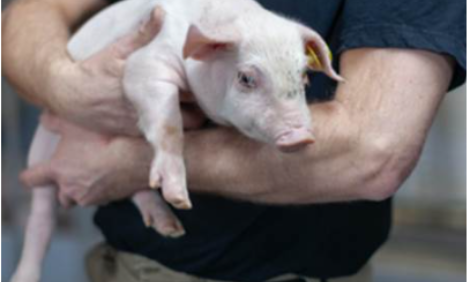



Effects of Antimicrobial Peptides in Diets for Nursery Pigs
In a Chinese study carried out on five commercial farms, weaning piglets receiving a diet supplemented with antimicrobial peptides had less diarrhoea and a higher survival rate than those on a similar diet without the supplement.The incidence of diarrhoea and mortality rate were lower in pigs receiving a diet containing antimicrobial peptides (AMPs) than the unsupplemented pigs in an experiment reported by H.S. Yang of the Chinese Academy of Sciences in Changsha City in Hunan and co-authors from other Chinese institutes.
In Livestock Science, they explain that the objective of their experiment was to evaluate the effects of dietary supplementation with AMPs on growth performance, diarrhoea incidence and survival rate of weaned pigs reared at five commercial farms (Farms A to E).
The pigs used were as follows:
- Farm A: n=486; genotype = Yorkshire (Y) × Landrace (L); weaning age = 28±3 days
- Farm B: n=360; genotype = Y× L × Duroc (D); weaning age = 30±2 days
- Farm C: n=558; genotype = Y × L × D; weaning age=30±2 days
- Farm D: n=828; genotype = Y × L × D; weaning age = 32±3 days and
- Farm E: n=576; genotype = Y; weaning age = 24±3 days.
The pigs were blocked (within farm) by body weight and sex and randomly assigned to one of three treatments:
- a basal diet (control)
- 2.0g per kg of AMPs (AMPs-2) and
- 3.0g per kg of AMPs (AMPs-3).
The AMPs used in the study were a mixture of lactoferrin, cecropin, defensin and plectasin.
Each treatment group consisted of six replicates per farm. Each replicate consisted of two pens of 13 to 14 pigs, two pens of 10 pigs, three pens of 10 to 11 pigs, four pens of 11 to 12 pigs and three pens of 10 to 11 pigs on Farms A, B, C, D and E, respectively.
Dietary supplementation with AMPs enhanced (linear, P<0.05; quadratic, P<0.05) average daily gain of weaned pigs on all five farms.
Average daily feed intake was increased (quadratic, P<0.05) by dietary supplementation with AMPs.
Feed conversion rate (G:F) was also enhanced (linear, P<0.05) when AMPs were included in the diets of weaned pigs on commercial farms.
The incidence of diarrhoea in AMP-supplemented pigs was lower (P<0.001) than that in control pigs.
The survival rate of pigs fed AMP-supplemented diet was higher (P<0.01) than the control pigs.
The present results indicated that AMPs had beneficial effects on growth performance, reduced the incidence of diarrhoea and increased the survival rate of weaned pig, the researchers concluded.
Reference
Xiong. X., H.S. Yang, L. Li, Y.F. Wang, R.L. Huang, F.N. Li, S.P. Wang and W. Qiud. 2014. Effects of antimicrobial peptides in nursery diets on growth performance of pigs reared on five different farms. Livestock Science. 167:206–210.
November 2014








